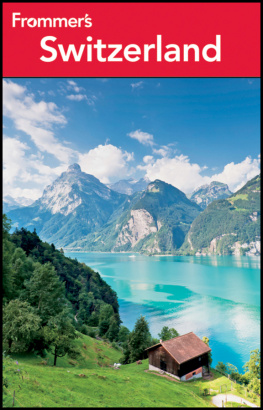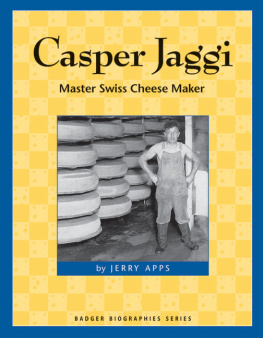Acknowledgements
This journey began when I read Lorenz Stuckis 1968 work Das Heimliche Imperium (The Secret Empire) and was impressed by the scope, complexity and inner connectedness of Switzerlands socioeconomic system. I gave the book as a present to my son Joshua for his 19th birthday in the hope that it would help him, as it had helped me, to understand more about the country he has grown up in, and of which he is a citizen.
Stuckis generation has come and gone, and his message no longer reaches a wide audience: his book was published only in German, and it is now out of print. A quick glance on Amazon reveals just how little has been published about Switzerland, and what is there is largely misleading, spurious or superficial. Switzerland was the home of Calvin and Zwingli discretion and understatement are pervasive. This, together with media preferences, has contributed to a poor or indeed negative correlation between visibility and substance. And while many people feel they know Switzerland after a fleeting visit or because of stereotypes, anyone who really knows the country well, understands that perceptions are radically at variance with realities. The aim of my effort has been to help the reader discover the differences.
I do not know how successful the book will be in this regard, but I do know who made it possible. Hugo Buetler, the former editor of the Neue Zrcher Zeitung newspaper, grew up in the same village as Stucki and, like me, appreciated his work, and sensed the need to at least try to set the record straight. In many ways, he has been the Spiritus Rector of this book.
Some people were critically important long before the book was started. George Geigy offered me my first job in Switzerland and I had the privilege of working next to him and Nicholas Baer in a close and intimate setting when he was President of the Swiss Stock Exchange. The late Franois Mayer, the trusted Swiss right-hand man of Lord (Jacob) Rothschild helped me start my own business and hone my judgements of people and situations. Professor Andre Dreiding ran the department of chemistry at the University of Zurich when chemistry moved from the compound to the molecular level. We had countless discussions of a philosophical nature and he introduced me to a number of the top Swiss scientists of his era. Their conduct and example and the interest they took in me have been decisive to my pathway.
Swiss Made is a sequel to Wirtschaftswunder Schweiz (Swiss Economic Miracle), which I wrote with Gerhard Schwarz, the former business and economics editor of the Neue Zrcher Zeitung, and now director of Avenir Suisse.
This book could not have been written without a great deal of research that had been done for the first book. Some of the contributors worked on both books and deserve double thanks. I must make special mention of Markus Christen, whose contribution to both books has shaped too many aspects to list here. It should suffice to say that neither Swiss Made nor the previous book would have been published without his tireless and multifaceted support in research, editing, and project management. The following people made significant contributions to specific chapters: Ueli Burkard (, on tourism). Angus McGeoch assisted with translations and Martin Berz worked tirelessly to find the right photos.
A project of this scope and magnitude depends heavily on the knowledge of the individual companies own historians and heads of communications, and their willingness to share access to their archives and non-public material. I owe a special debt to Albert Pfiffner, Nestls historian; Patrick Halbeisen, historian of the Swiss National Bank; Tobias Straumann of the University of Zurich; and Rudolf Minsch, the chief economist at Economie Suisse. Their commitment to historical accuracy has deeply impressed me.
It would not have been possible to chronicle UBSs eventful recent history without the assistance of Michael Willi, head of global communications of UBS, who has somehow survived the repeated UBS debacles of the past decade to tell the story. Bjorn Edlund served as head of communications for Marc Moret at Sandoz during its merger with Ciba-Geigy, and then for Jrgen Dormann during his turnaround of ABB, and shared remarkable insights. His contribution has been remarkable.
Possibly the biggest contributors to this book have been the leaders of Swiss industry, finance and government who made time for interviews with me. Switzerland places a high value on discretion and privacy, and they have been quoted in the book only where I have had their permission to do so. To an inordinate degree, however, my analytical and prospective assessments have been drawn and composed from their collective wisdom. While I shall respect my interviewees privacy by not naming them, their patience, interest, and support have been critical to the content of the book. Many were good enough to read draft versions and provide valuable comments and suggestions on how to improve the text.
I should also like to thank Harvard Colleges Center for International Development for offering me a fellowship in connection with research associated with the book. Harvard is a treasure chest of knowledge and talent, and I did my best to mine whatever was within my minds grasp. Thanks to Howard Stevenson of the Harvard Business School and Adi Ignatius, editor of the Harvard Business Review, who supplied copies of all business cases ever written on Swiss companies. Robert Darnton, Director of the Harvard University Library, and an historian of European history, lived in Switzerland, and took a special interest in my work. Jane Mansbridge taught me where freedom and democracy came from. And Barbara Kellerman showed me that there is a necessary equation linking genius and circumstance. Otherwise, I had the opportunity to go into the ring with Martin Feldstein, Niall Ferguson, Robert Lessig, Ken Rogoff and Larry Summers and emerged each time humbler and more knowledgeable than when I went in.
A number of companies and individuals encouraged and supported me in this endeavour, thereby making this book and my Harvard fellowship possible, including (as companies and foundations) ABB, Alfred Schindler Foundation, Anova Holding, Dow Europe, Holcim, Jacob Johan Rieter Foundation, Jacobs Foundation, Nestl, Sandoz Foundation, UBS and Walter Haefner Foundation, and (as individuals) Professor Giorgio Behr, Bernard Sabrier, Hansjrg Wyss and Dr Stephen Zuellig. From the outset it was formally agreed that their support was not in any way linked to the outcome.
Books are like marathons, and as with any human endeavour satisfaction comes from both what is achieved, and who it is done with.
The editorauthor relationship can be metaphysical. Ian Rodger spent a long and distinguished career with the Financial Times and covered more places and industries than I thought existed, ending up as international news editor. The finished text owes much to his critical comments on earlier drafts, which have long since been buried some quietly, others after heated debate. It was these exchanges that helped to make sense where there was confusion. In other instances they provided ripe and necessary moments of humour. Nobody except me knows the value of his countless comments and suggestions, or restorative bouts of humour but it has been immense. Writing, like a sculpture, is significantly defined by what is removed.
Nelli Doroshkin, a graduate of Harvard, and law student at Georgetown University, was also a stalwart in the core team that made Swiss Made happen. She slaved over endless text revisions, provided valuable editorial input light years beyond her age, and was often the glue that held everything together.
Richard Walker, a former editor of the Economist Intelligence Unit, was helpful in providing structure and flow. Special thanks to Barbara Beck of










